7 expert-approved ways to relieve hot flashes
There are many things you can do to minimize this symptom, which can start during perimenopause.
Updated on July 18, 2024

As many as four in five people going through perimenopause and menopause will experience hot flashes—the rapid onset of a sensation of extreme heat that can cause a flushed face and sweating, sometimes followed by chills. Whether hot flashes happen in the middle of an important meeting or at night, they can be uncomfortable and frustrating.
Hot flashes can last for just a few months, or can come and go for more than 10 years. There are many short- and long-term treatments that may help you feel better.
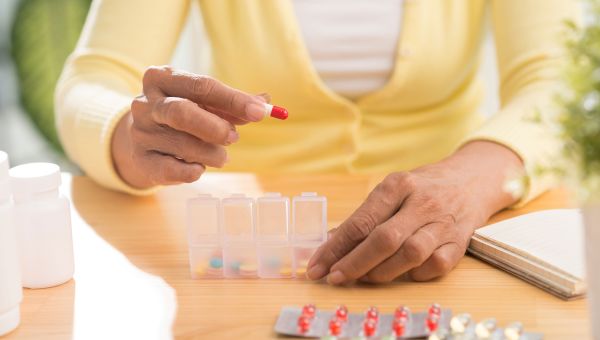
Consider menopausal hormone therapy
The medical approach to hot flashes centers on balancing estrogen and bringing your body’s thermal regulation back in line, says Christina Cox, MD, of OBGYN Specialists of Macon, in Macon, Georgia. When hot flashes begin to interfere with daily activities, medical treatment called menopausal hormone therapy (MHT) is an option. It is available in the form of a patch, oral pills, or vaginal ring.
Despite earlier concerns about MHT, many major women’s health organizations now approve and recommend this treatment for the right candidate, says Dr. Cox. These include the North American Menopause Society, the American Society for Reproductive Medicine, and the American College of Obstetricians and Gynecologists.
For people who still have a uterus, combination estrogen and progestogen is recommended, as the progestogen can help prevent uterine cancer. If you don’t have a uterus, estrogen alone is usually sufficient. Speak with your OBGYN about whether MHT is right for you.
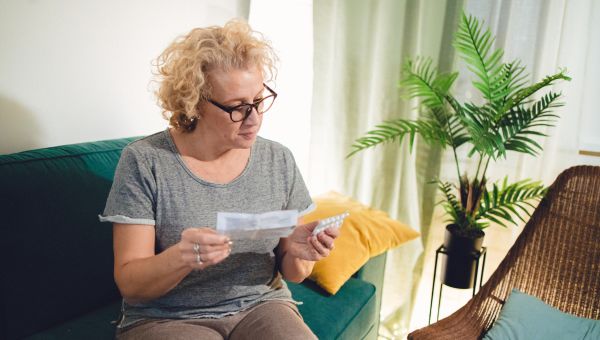
Other types of medication are available
For those who can’t—or don’t want to—take hormones to relieve hot flashes, there two nonhormonal medications that are approved to treat hot flashes in the United States.
- Ordinarily used for depression, prescription-only paroxetine may provide some hot flash relief when used in lower doses. Other antidepressants, such as venlafaxine or fluoxetine, may also be recommended.
- Fezolinetant was approved by the U.S. Food & Drug Administration (FDA) in May 2023 specifically for the treatment of hot flashes caused by menopause. It helps manage the brain's regulation of body temperature.
Gabapentin, an anti-seizure medication, and clonidine, a blood pressure medication, are two other drugs that may reduce symptoms. Some medications are better than others for certain people. You and your OBGYN can determine your best course of action.

Wear layers and choose your fabric wisely
In addition to making you feel warm, hot flashes may make you feel chills afterwards. Wearing easy-to-shed layers and moisture-wicking clothing can help you adjust. “Dressing in layers allows you to somewhat stabilize your temperature as you change environments,” says Cox.
During the winter, try layering short-sleeve tops, sweaters, scarves, and light jackets. When you feel a hot flash coming on, you can peel off clothes to stay cooler. When you feel chilly afterwards, you can put your warmer pieces back on.
As for fabrics, try those that are breathable and light, like cotton and bamboo.
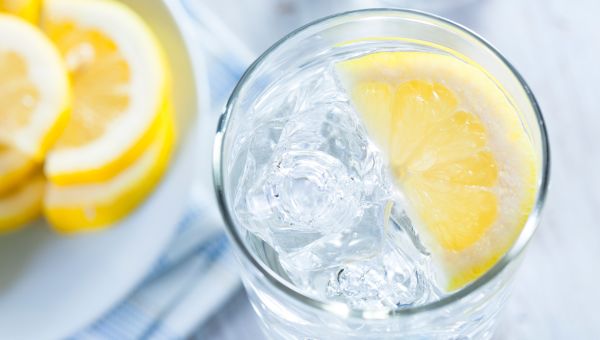
Keep fans and ice cubes handy
Stay prepared for hot flashes by keeping a fan by your side. Invest in a mini fan for your desk at work, and keep hand-held, foldable fans in your handbag.
Consider keeping a stainless-steel or insulated bottle nearby, filled with ice water. If you experience night sweats, turn your thermostat lower than usual and consider buying cooling sheets in fabrics such as bamboo or microfiber.

Steer clear of triggers
Certain foods can make hot flashes feel worse, last longer or occur more frequently. Spicy foods such as hot peppers can trigger hot flashes. So can alcohol, caffeine, and, for some people, sugar.
Try to incorporate more plant-based foods such as chickpeas, lentils, whole grains, and soybeans into your diet. These foods contain phytoestrogens, natural compounds that may reduce hot flash symptoms.

Try Stress Reduction Techniques
For some people, stress and anxiety can contribute to hot flashes. While it’s impossible to avoid all causes of stress in daily life, there are techniques and habits you can try to help relieve worry and tension:
- Practice meditation, deep breathing, and positive thinking techniques
- Aim to get seven to nine hours of sleep per night
- Take time for exercise and consider yoga, which may be particularly helpful for relieving stress
- Treat yourself to something you enjoy
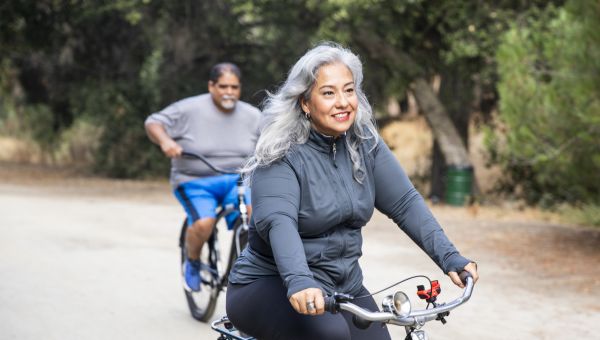
Exercise and maintain a healthy weight
Some research suggests a connection between obesity and increased risk for hot flashes, so it’s important to aim for getting regular physical activity, eating a healthy diet, and managing your weight as you go through perimenopause and menopause. A 2022 study published in Menopause found that following a plant-based diet including daily soybean consumption led to weight loss and reduced hot flashes by up to 88 percent in postmenopausal people who had not had a period for at least one year and were still experiencing hot flashes.

Barnard ND, Kahleova H, Holtz DN, et al. A dietary intervention for vasomotor symptoms of menopause: a randomized, controlled trial. Menopause. 2023 Jan 1;30(1):80-87.
Saccomani S, Lui-Filho JF, Juliato CR, et al. Does obesity increase the risk of hot flashes among midlife women: a population-based study. Menopause. 2017 Sep;24(9):1065-1070.
Bansal R, Aggarwal N. Menopausal Hot Flashes: A Concise Review. J Midlife Health. 2019 Jan-Mar;10(1):6-13.
Nancy Ferrari. “Menopause-related hot flashes and night sweats can last for years.” Harvard Health Publishing. August 14, 2020.
UpToDate.com. “Menopausal hot flashes.” October 2020. Accessed November 12, 2020.
Mayo Clinic. “Hot flashes.” April 24, 2020. Accessed November 12, 2020.
Merck Manual Professional Version. “Menopause.” December 2019. Accessed November 12, 2020.
UpToDate.com. “Patient education: Non-estrogen treatments for menopausal symptoms (Beyond the Basics).” October 2020. Accessed November 12, 2020.
MedlinePlus. “Venlafaxine.” December 15, 2017. Accessed November 12, 2020.
UpToDate.com. “Patient education: Menopausal hormone therapy (Beyond the Basics).” October 2020. Accessed November 12, 2020.
The North American Menopause Society. “The Experts Do Agree About Hormone Therapy.” 2020. Accessed November 12, 2020.
The North American Menopause Society. “Treating Hot Flashes.” 2014. Accessed November 12, 2020.
Cleveland Clinic. “Menopause: Non-Hormonal Treatment & Relief for Hot Flashes.” January 16, 2017. Accessed November 12, 2020.
Hormone Health Network. “Alternative Medicine for Menopause Treatment.” 2020. Accessed November 12, 2020.
The North American Menopause Society. “Stress: Getting Serious About Solutions.” 2020. Accessed November 12, 2020.
The North American Menopause Society. “Menopause FAQS: Hot Flashes.” 2020. Accessed December 15, 2020.
Harvard Health Publishing. “Perimenopause: Rocky road to menopause.” April 14, 2020. Accessed December 16, 2020.
J Sassarini and RA Anderson. “New pathways in the treatment for menopausal hot flushes.” The Lancet. May 6, 2017. Volume 389, Issue 10081, p1775-1777.
JV Pinterton, FS Aguirre, et al. “The 2017 hormone therapy position statement of The North American Menopause Society.” Menopause: The Journal of The North American Menopause Society. 2017. Menopause, Vol. 24, No. 7, pp. 728-753.
S Aminimoghaddam and N Abolghasem. “A Review of Management of Perimenopausal Hot Flashes.” Journal of Obstetrics, Gynecology and Cancer Research. Winter 2019. Volume 4, Issue 1.
KA Toulis, T Tzellos, et al. “Gabapentin for the Treatment of Hot Flashes in Women With Natural or Tamoxifen-Induced Menopause: A Systematic Review and Meta-Analysis.” Clinical Therapeutics. February 2009. 31(2):221-35.
G Kelsberg, L Maragh, S Safranek. “Which nonhormonal treatments are effective for hot flashes?” Journal of Family Practice. May 2016. 65, no. 05: E1-E3.
U.S. Food & Drug Administration. FDA Approves Novel Drug to Treat Moderate to Severe Hot Flashes Caused by Menopause. May 12, 2023.
H Hairi, AN Shuid, et al. “The Effects and Action Mechanisms of Phytoestrogens on Vasomotor Symptoms During Menopausal Transition: Thermoregulatory Mechanism.” Current Drug Targets. 2019. Volume 20, Number 2, pp. 192-200(9).
DS Burns and JS Carpenter. “Paced Respiration for Hot Flashes?” The Female Patient. July/August 2012. Volume 37.
More On


video
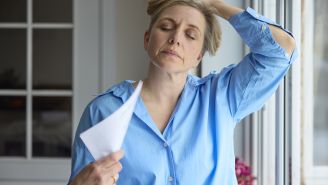
article


video


video


video
